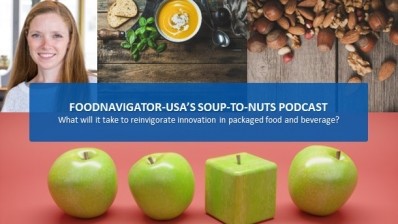Beyond IV debuts in retailers, features simplified label and improved taste

Participating retailers include Walmart, Kroger, Albertsons, Publix, Whole Foods Market, Sprouts and more. Beyond Meat will also feature recipes and cooking videos for Beyond Burger and Beyond Beef, in addition to a cookbook expected for release this summer.

Addressing clean label and processed foods
Following recommendations from medical and nutritional experts, including Bauer, and health organizations, Beyond IV’s recipe replaced canola and coconut oil blends with avocado oil, which is “high in monounsaturated fats” and provides a “neutral flavor,” compared to olive oil, which exhibits a similar nutrition profile but with a “pungent” flavor, Bauer explained during Beyond Meat’s tasting event that took place in New York City earlier this week.
The removal of the coconut and canola oil blends simplifies the products’ ingredient list and landed Beyond IV Good Housekeeping’s Nutritionist Approved Emblem and a Clean Label Project certification.
Improving protein, reducing saturated fat
Beyond IV features 2 grams of saturated fat per serving, a 60% reduction from the previous iteration and compared to 80/20 beef, a 75% reduction in saturated fat.
The new recipe also features a 20% reduction in sodium and has 21 grams of protein by including a “diverse amount of high-quality plant proteins,” including peas, red lentils, brown rice and fava beans.
The new iteration of Beyond Meat’s products, along with the company’s Beyond Crumbles and Beyond Steak, are recognized by health organizations, including the American Diabetes Association and American Heart Association’s Heart-Check program.
Additionally, Beyond Meat will work with the American Cancer Society in a multi-year agreement to “advance research on plant-based meat and cancer prevention,” the company shared in a statement.
Balancing consumer concerns about processing in the plant-based category
The reformulation seeks to balance consumer concerns about ultra-processing in the plant-based category, and their desire for taste and texture, which continue to serve as the deciding factors.
Of these concerns, Bauer acknowledged that “it is not the processing and the progression of technology, [rather] it is the end product that matters,” citing the need for clearer distinctions between a formulation and the final product, including fortified foods which Beyond Meat decided to “stay away [from] for now.”
She added, “It feels ridiculous to me that you have put something like hummus and salsa and whole grain breads … in the same sort of pocket as things like cakes and cookies and desserts.”
Currently, there is no formal FDA definition of ultra processed foods as research is still ongoing. However, many public health advocates, researchers and stakeholders use the NOVA classification system to define ultra processed food. Foods are assigned to one of four groups within the NOVA system:
- Group 1-- Unprocessed and minimally processed foods: includes fruits, vegetables, egg, meat and milk
- Group 2-- Processed culinary ingredients: includes oils, butter, sugar and salt that are derived from the first group or from nature through pressing, refining, grinding, milling and drying
- Group 3-- Processed foods: includes foods that are combined in groups one and two, i.e. breads and jams
- Group 4-- Ultraprocessed foods: includes foods that are significantly altered and contain high levels of unhealthy fats, refined sugars and salt
While the NOVA system provides more details on the chemical and physical properties of these ingredients, critics argue that individuals can still eat healthy foods within an unhealthy diet.
Rather than focusing on processing, Bauer contends, “it is the end result of the food that you are making that matters the most,” and the extent to which foods “enhance your heart health and brain health.”
She added, “So, if it is a food that is not packed or comes through a processing regimen that adds saturated fats, adds sugar, adds sodium and some harmful ingredients … but instead produces something that has loads of health attributes, it does not matter if it is a single process, double process [or] ultra process.”










